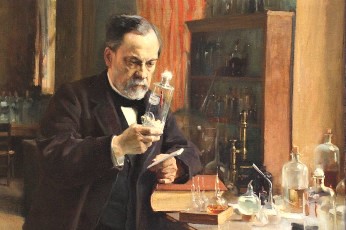Louis Pasteur? René Vallery-Radot? Jacques Orhon? Malcolm Kushner? Apocryphal?

Question for Quote Investigator: The famous French scientist Louis Pasteur has received credit for the following remark:
A bottle of wine contains more philosophy than all the books in the world.
I have been unable to find a good citation. Would you please help?
Reply from Quote Investigator: Louis Pasteur lived between 1822 and 1895. QI conjectures that the statement above evolved from a passage in a letter written by Pasteur in 1843.
René Vallery-Radot was Pasteur’s son-in-law, supporter, companion, and biographer. In November 1900 Vallery-Radot published an article in “Revue Politique et Littéraire: Revue Bleue” (“Political and Literary Review: Blue Review”) titled “La Vie de Pasteur” (“The Life of Pasteur”) which included the following. Boldface added to excerpts by QI:1
Nouvelle lettre au mois de décembre 1843, recommandation directe à son fils.
Dis à Chappuis que j’ai mis en bouteilles du 1834 acheté tout exprès pour boire à l’honneur de l’École normale, et cela pour les premières vacances. Il y a de l’esprit au fond de ces cent litres plus que dans tous les livres de philosophie du monde. Mais pour des formules de mathématiques, ajoutait-il, je crois qu’il n’y en a pas. Dis-lui bien que nous boirons la première bouteille avec lui. Soyez toujours de bons amis.
In 1900 Vallery-Radot published a biography of Pasteur which was translated from French to English in 1902 by Mrs. R. L. Devonshire. The following passage corresponded to the text above:2
Another letter, December, 1843, to his son this time: “Tell Chappuis that I have bottled some 1834 bought on purpose to drink the health of the Ecole Normale during the next holidays. There is more wit in those 100 litres than in all the books on philosophy in the world; but, as to mathematical formulæ, there are none, I believe. Mind you tell him that we shall drink the first bottle with him. Remain two good friends.”
Below are additional selected citations in chronological order.
In 2001 “Le Nouveau Guide des Vins de France” (“The New Guide to French Wines”) by Jacques Orhon presented a quotation attributed to Pasteur in a box separated from the main text. No citation was given:3
Il y a plus de philosophie dans une bouteille de vin que dans tous les livres.
Louis Pasteur
né à Dôle (1822-1895)
Here is one way in which the line above can be rendered into English:
There is more philosophy in a bottle of wine than in any book.
In 2003 “Vintage Humor for Wine Lovers” by Malcolm Kushner printed the following:4
Throughout the ages, drinking wine and getting drunk have gone hand-in-hand. For example, in 19th century France, Louis Pasteur observed, “A bottle of wine contains more philosophy than all the books in the world.” And you know, he must have been pretty tanked up when he said that.
In 2004 “The Mammoth Book of Zingers, Quips and One-Liners” compiled by Geoff Tibballs included this entry:5
A bottle of wine contains more philosophy than all the books in the world.
Louis Pasteur
In conclusion, there is substantive evidence that Louis Pasteur should be credited with the passage published by René Vallery-Radot in 1900. The words appeared in an 1843 letter from Pasteur according to Vallery-Radot who was the prominent scientist’s son-in-law and biographer. The modern quotation is somewhat different, but QI hypothesizes that it evolved from the text of the letter.
Image Notes: Oil on canvas portrait of Louis Pasteur by Albert Edelfelt circa 1885; accessed via Wikimedia Commons. The image has been resized, retouched, and cropped.
Acknowledgement: Great thanks to Mark Pallen whose inquiry led QI to formulate this question and perform this exploration.
Update History: On March 30, 2025 the format of the bibliographical notes was updated.
- Date: 10 Novembre 1900 (November 10, 1900), Journal: Revue Politique et Littéraire: Revue Bleue, Article: La Vie de Pasteur, Author: R. Vallery-Radot, Start Page 580, Quote Page 587 and 588, Publisher: Bureau des Revues, Paris. (Google Books Full View) link ↩︎
- 1902, The Life of Pasteur by René Vallery-Radot, Translated from the French by Mrs. R. L. Devonshire, Volume 1, Chapter 1: 1822-1843, Quote Page 31, Archibald Constable & Company, Westminster. (Google Books Full View) link ↩︎
- 2001, Le nouveau guide des vins de France by Jacques Orhon, Section: Jura, Quote 213, Les Editions de l’Homme, Montréal, Canada. (Verified with scans) ↩︎
- 2003, Vintage Humor for Wine Lovers by Malcolm Kushner, Chapter 4: Veni, Vidi, Vino: I Came, I Saw, I Got Drunk, Quote Page 46, Malcolm Kushner & Associates, Santa Cruz, California. (Verified with scans) ↩︎
- 2004, The Mammoth Book of Zingers, Quips and One-Liners: Over 8,000 Gems of Wit and Wisdom, One-Liners and Wisecracks, Compiled by Geoff Tibballs, Topic: Wine, Quote Page 561,Carroll & Graf Publishers, New York. (Verified with ebook) ↩︎